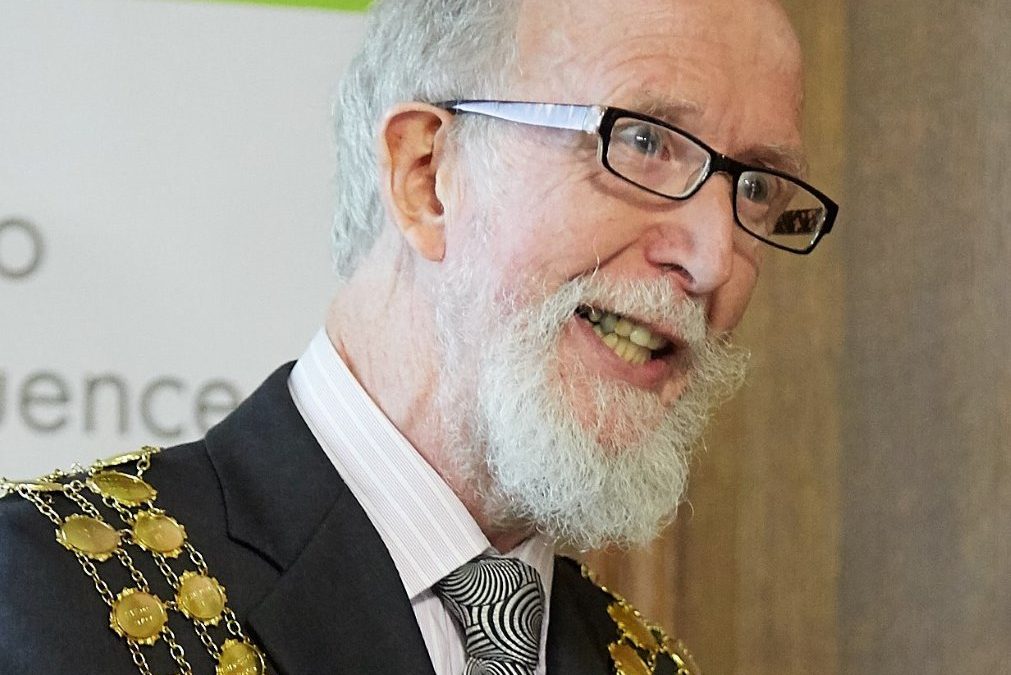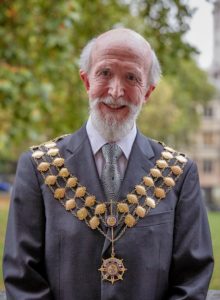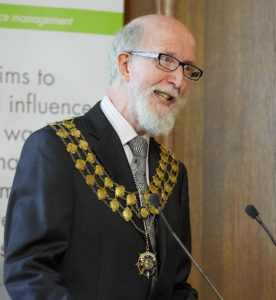14 October, 2018 | Publication, Resource and waste management
According to the UNEP and ISWA’s Global Waste Management Outlook (GWMO), three billion people lack access to basic solid waste management (SWM) services; addressing this global waste crisis would not only vastly improve their lives but also halve the weight of plastics entering the oceans. Professor David C Wilson and Mike Webster of Wasteaid made the case earlier this year, in an open access editorial in the ISWA journal Waste Management & Research, for community waste management as a ‘bottom up’ approach, to run in parallel to traditional ‘top-down’ approaches led by donors and governments.
Community waste management aims to help local communities in the poorest countries, where the local authority often has no funds to provide a SWM service, to tackle the problem themselves through the resource value in the wastes. If, for example, food wastes or low-value plastics are kept separate, they can be turned into new, useful products. With simple tools and the right knowledge, people can become self-employed recycling entrepreneurs, providing a very valuable service for the health and wellbeing of their community, and the whole planet – as well as reducing poverty and creating sustainable livelihoods.
One of the gaps identified by the GWMO was for practical guidance on such low-cost ‘waste to wealth’ technologies which involve minimal capital investment and make products to sell in a local market. DCW’s CIWM Presidential Report aimed to plug that gap: Wasteaid prepared a Toolkit, including a dozen How-to-do-it Guides for simple technologies using organics and low-value plastics.
While preparing the Toolkit, we identified a parallel requirement, for the scientific underpinning of some of the technologies. This month sees the publication of a paper on optimising the technology for producing plastic bonded sand blocks, for use e.g. as paving slabs, from the low value LDPE film plastic, which is a major problem even in the least-developed countries. Our team at Imperial College London was led by Professor Chris Cheeseman, with the laboratory research carried out by Alexander Kumi-Larbi Jnr and Danladi Yunana. The technology was developed by another co-authors, Pierre Kamsouloum, a self-taught entrepreneur from the Cameroun.

18 October, 2017 | Awards, Resource and waste management

Professor David C Wilson following his inauguration in Westminster as 2017-18 CIWM President

Professor David C Wilson giving his inauguration speech as CIWM President 2017-18
https://samtech.edu/accutane-treating/
Professor David C. Wilson has been inaugurated as the 102nd President of CIWM, the UK and Irish professional body for resources and waste, at a reception in London. He described solid waste management as one of the key utilities and said that as public sector budgets continue to come under pressure, “we must not lose sight of where we have come from, that the service exists first and foremost to protect public health”. He highlighted the ‘global waste management emergency’, where 40% of the World’s population lacks this basic utility service. He also launched his Presidential report, Making Waste Work: A Toolkit, prepared by WasteAid UK and aimed at helping unserved communities in the least developed countries to help themselves, by developing self-sustaining businesses making useful products for the local market from the resource value in their waste.
Outlining the importance of legislation in the substantial progress that has been made in the sustainable and safe management of waste since the early 1970s, Professor Wilson added that there can be no softening of the regulatory framework. “Two major priorities for CIWM in the UK are to ensure that following Brexit we have continuity of the strong regulations on which the very existence of the waste and resources industry depends, and the continuing fight against waste crime.”
While continuity is important on one hand, DCW went on to talk about the step change in approach to resources and waste that is happening, and he called for a “necessary parallel focus on the 3Rs – reduce, reuse, recycle – and on the shift from the linear model to a circular economy where resource efficiency and productivity is key”. An integrated and inclusive approach will be needed, he said, as well as a balanced set of policy drivers.
Professor Wilson highlighted that, despite the progress that has been made, more than 2 billion people have no waste collection at all and the waste of over 3 billion people is either dumped or subject to uncontrolled burning. This matters: for example, children growing up in households without waste collection have double the rate of diarrhoea and six times the rate of acute respiratory infection; and open burning of waste could double the current, official IPCC estimates of the contribution of methane emissions form landfill of waste to global warming. However, he also sees this ‘global waste management emergency’ as an opportunity for the international community. “If we can increase the proportion of existing international development finance being directed at SWM from the current, fairly derisory, 0.3% to just 3% up to 2030, as recommended in the GWMO, then not only can we extend waste collection to all and eliminate open dumping and burning of waste, but due to the cross-cutting nature of waste management, we can also make progress against no fewer than 12 out of the 17 UN Sustainable Development Goals agreed by world leaders to achieve a sustainable future for our planet.”
Press coverage:
Resource: Community waste schemes, the global waste crisis, domestic issues, DCW’s life in waste.
Waste Management World: Waste as a utility, domestic issues, the global waste emergency.
Letsrecycle.com: Global waste emergency, community waste toolkit
Recycling Waste World: Community waste toolkit
CIWM-journal: Waste as a utility, domestic issues, the global waste emergency, community waste toolkit
Interview with DCW in CIWM Journal:
22 November, 2016 | Awards, Publication, Waste Management
Professor David C Wilson was installed as Senior Vice President of the Chartered Institution of Wastes Management on 18 October 2016. CIWM has now commissioned WasteAid UK to undertake his Presidential project, which will prepare guidance on low-cost reuse and recycling technologies for use in low- and middle- income countries. This was one of the recommendations for follow-up work coming out of the 2015 UNEP Global Waste Management Outlook, for which DCW was the Editor-in-Chief.
Further information is available in a joint CIWM and Wasteaid UK press release issued today. Professor Wilson said: “More than two billion people worldwide do not have a waste collection service, which results in severe public health problems – through children playing amongst waste, blocked drains, infectious diseases and inhalation of smoke from open burning. Even when waste is collected, uncontrolled dumping is the norm – the waste of some 3 billion people isn’t disposed of safely.
“Many cities in Africa and Asia are growing so rapidly that in 15-20 years’ time they will be generating twice as much waste as they do today. Already struggling with the waste crisis, these cities desperately need targeted support from the international community. In the meantime, sustainable and self-financing community-led solutions can make immediate improvements, hence the focus of this research.”
WasteAid UK delivers training in community waste management in low- and middle-income countries. In its first year the charity has worked in the Gambia, Senegal, Ghana and Kenya, setting up community recycling facilities and positively impacting the lives of some 124,000 people.
Mike Webster of WasteAid UK said: “This guidance, funded by CIWM, will enable us to help thousands of communities around the world to improve the way they manage their waste. It will show people how to treat different materials to maximise their value and minimise risks to human health and the environment.” DCW is Patron of Wasteaid UK.
1 April, 2016 | Waste Management
UNEP’s inaugural Global Waste Management Outlook (GWMO), which DCW edited, estimates that around 2 billion people worldwide still lack access to regular waste collection; while a larger number, around 3 billion, lack access to controlled disposal services for municipal https://www.babyscanclinic.com/blog/buy-cialis-tadalafil-online-20-mg/ solid wastes. WasteAid UK is a relatively new development charity set up by professionals to mobilise the UK waste and resource industry both to campaign and to address directly the global waste crisis, bringing solid waste management services to poor communities in the least developed countries. The particular niche where Wasteaid UK has chosen to focus is supporting unserved communities in Africa to recycle their wastes into sellable products, thus developing livelihoods, alleviating poverty AND establishing a sustainable solid waste collection and management system. I am proud to be the Patron of WasteAid UK, and encourage you to give us your support. Please read my blog on Responding to the global waste management crisis.
1 December, 2015 | Publication, Waste Management
DCW has published two papers with Costas Velis to disseminate the UNEP/ ISWA Global Waste Management Outlook (GWMO), published in September 2015, for which DCW was Editor-in-Chief and lead author. Their editorial in the December issue of the ISWA peer-reviewed journal Waste Management & Research is titled: Waste management – still a global challenge in the 21st century: An evidence-based call for action. Their article for the CIWM monthly magazine, Global Goal-Getters, was published in the October issue. Both papers can be downloaded free of charge, as can the GWMO summaries and full report.


